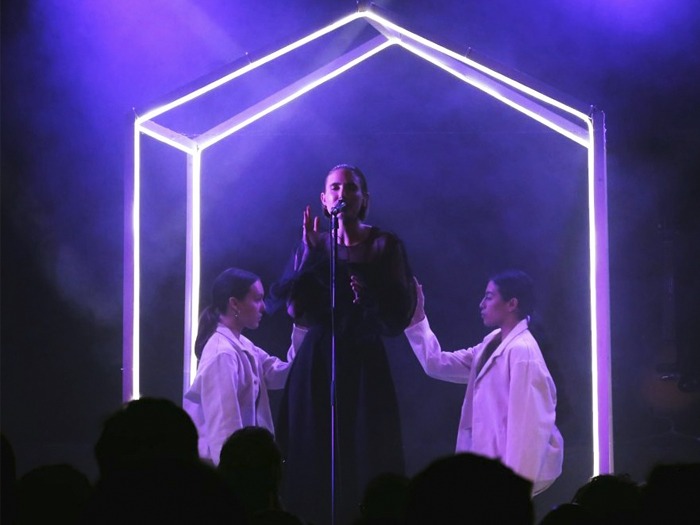Following the release of their studio album Ephyra, which singer Fiona Burgess described as “a kind of rebirthing”, Woman’s Hour brought their musical journey to a close with a final show in their hometown before parting ways to work on separate projects.
The band performed a farewell concert at London’s The Dome in Tufnell Park. Creating an appropriately ethereal vibe for the concert was a production concept that drew on simple, but impactful imagery, while it played with negative space. Created by David Howard, and based entirely on lighting, this design was controlled by a ChamSys MagicQ MQ80 console.
Forming the foundation of the band’s entire stage aesthetic was an illuminated structure of a house. Deliberately simplistic and pure in its design (a visual element lifted from the band’s recent music video for single “Don’t Speak”), the house not only provided the band and dancers on stage with a unique performance environment, it also served as a symbol of Woman’s Hour “coming home” for one final show.
The aim of the illuminated house was to provide an extremely softly-lit space that the dancers and band could interact with, perform inside and use to show contrast and progression over the course of the show.
“Our light on the structure had to be continuous in appearance,” said Howard. “Research into technology that could achieve the required aesthetic was extensive. The concept actually came through many conversations with Fiona Burgess, Woman’s Hour singer. She loved the idea of an illuminated simplistic ‘fluorescent’ house structure as a set piece. This evolved into the statement house stage environment that eventually came to fruition for the show.”
The budget was always a factor in this design, according to Howard. “Initially I was brought on to the project to take the show through and make it work in the venue,” he said. “It was thought impossible to have custom elements like the house for this performance. However, with research and by working non-traditional technology, a cost-effective and impactful lighting design was possible.”
Utilizing The Dome’s in-house Chuavet Professional STRIKE 1, as well as Rogue R2 Wash fixtures, Howard juxtaposed diffused white illumination from the structure against unusual, yet carefully balanced, colour through heavy doses of haze. This added a dreamy, almost otherworldly aura to the stage.
“The space inside the house appeared to glow,” said Howard. “It had to contrast starkly with the void of negative space outside, making it impactful when the dancers entered and exited for select songs. This evoked a variety of emotional states, especially when we complemented it with balanced side lighting from the R2s”
Having performed at the venue on a previous tour, Howard was able to take a show file containing the in-house venue rig as a starting point for the foundation of his design. Using his ChamSys MagicQ MQ80 console, he easily adapted his design to the existing in-house lighting rig within the venue.
“The custom illuminated house structure was by nature something completely bespoke,” said Howard. “Using the ChamSys console made it easy to pre-program this element before it even existed. I was able to make a head file for the house structure that could be controlled intuitively in minutes. I like using technology to create something unique when and where this is possible. The ChamSys Head Editor and Fixture Creator have always made this process easy from a control side of things.”
As with most shows, the pre-production window for the farewell show wasn’t infinite. Fortunately, Howard was able to make use of the ChamSys PreVis software to program and design his rig in the days before entering the venue.
“The show was designed and pitched in Wysiwyg and pre-programmed using ChamSys MagicVis, which is a super convenient solution when on the go,” said Howard. “A surprising amount of my programming happens on trains or in airports. I’ve always been a fan of the ChamSys inbuilt visualization. It’s incredibly quick to set up and doesn’t drain laptop battery. For bigger shows, I like the way that ChamSys interfaces with other software. For example, auto-patching from other lighting software is impressive and makes preparing for multiple shows in busy periods easy.”
With Howard’s lighting concept encompassing all manner of looks, from audience blinding to warmer eye candy to the neon effect of the house structure, the production at The Dome provided a fitting farewell to one of contemporary music’s most evocative groups.


